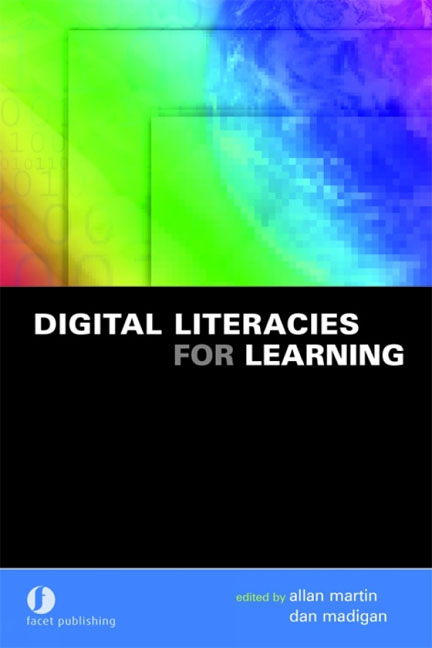Book contents
- Frontmatter
- Contents
- Dedication
- The contributors
- Foreword
- Preface
- Part I Literacies in the digital age
- 1 Literacies for the digital age: preview of Part 1
- 2 Learners, learning literacy and the pedagogy of e-learning
- 3 Real learning in virtual environments
- 4 Digital fusion: defining the intersection of content and communications
- 5 Literacy and the digital knowledge revolution
- 6 Understanding e-literacy
- 7 Information literacy – an overview
- 8 Contemporary literacy – the three Es
- 9 Reconceptualizing media literacy for the digital age
- 10 Literacy, e-literacy and multiliteracies: meeting the challenges of teaching online
- 11 Graduate e-literacies and employability
- Part II Enabling and supporting digital literacies
- Index
11 - Graduate e-literacies and employability
from Part I - Literacies in the digital age
Published online by Cambridge University Press: 08 June 2018
- Frontmatter
- Contents
- Dedication
- The contributors
- Foreword
- Preface
- Part I Literacies in the digital age
- 1 Literacies for the digital age: preview of Part 1
- 2 Learners, learning literacy and the pedagogy of e-learning
- 3 Real learning in virtual environments
- 4 Digital fusion: defining the intersection of content and communications
- 5 Literacy and the digital knowledge revolution
- 6 Understanding e-literacy
- 7 Information literacy – an overview
- 8 Contemporary literacy – the three Es
- 9 Reconceptualizing media literacy for the digital age
- 10 Literacy, e-literacy and multiliteracies: meeting the challenges of teaching online
- 11 Graduate e-literacies and employability
- Part II Enabling and supporting digital literacies
- Index
Summary
Abstract
Graduate employability has become a major concern of politicians, government and state funding agencies, and universities ever since the expansion of higher education began in the 1960s. In this chapter we review recent developments in thinking about graduate skills, focusing particularly on e-literacies and their relationship to the wider employability agenda. We base our analysis on data that we gathered during a European Commission funded project in seven universities across Europe. Our study explored the work universities have been doing in developing undergraduate e-literacies, the skills and attitudes of their undergraduate students, employers’ perspectives on graduate skills, and likely directions for graduate e-literacy development in the future.
Background
Recent trends in graduate employability thinking
Governments of all persuasions and worldwide regard education as the foundation on which they will build successful economies that are able to withstand the buffeting of changes in the global marketplace in which they exist. This concern with education as a key ingredient in prosperity is reflected in their interest in expanding and improving education, by whatever means is open to them politically. The European Union (EU) expresses this interest openly in its various policy and strategy documents, for example, ‘becoming the most competitive and dynamic knowledge-based economy in the world, capable of sustainable economic growth with more and better jobs and greater social cohesion’ (EU, 2000, 2003a, 2005). Remaining, or becoming, one of the most advanced and developed states or super-states is seen to be closely linked to the ‘knowledge economy’ where intellectual, rather than physical, resources are key to wealth-generation. Information and communications technology (ICT) is a vital part of the knowledge economy, providing the automation, the creativity tools, the local and global communications and part of the support for mass post-compulsory education. A population that is e-literate and confident is a sine qua non for success in the modern world. All governments look to their education systems to ensure that those who ‘graduate’ from them are competent at relevant skill levels.
EU member states make similar pronouncements (UK, 1998; Finland, 1999), and these are mirrored by government agencies in the USA and Australasia (US, 2002; US, 2005a, 2005b). Worldwide, developed and developing countries seek to raise e-literacy to raise prosperity (Kerala, 2005; UNESCO, 2005; NZ, 2005).
- Type
- Chapter
- Information
- Digital Literacies for Learning , pp. 123 - 132Publisher: FacetPrint publication year: 2006



